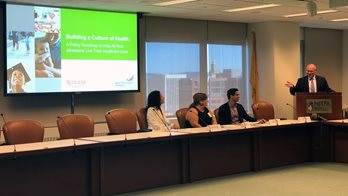 The average health of New Jersey residents is improving. But there are significant and troubling gaps, particularly affecting low income people and minorities. That was one of the points raised during presentations on health and heath policy held at the Together North Jersey Forum that NJTPA hosted on September 17.
The average health of New Jersey residents is improving. But there are significant and troubling gaps, particularly affecting low income people and minorities. That was one of the points raised during presentations on health and heath policy held at the Together North Jersey Forum that NJTPA hosted on September 17.
According to Dr. Giridhar Mallya, Senior Policy Officer for the Robert Wood Johnson Foundation, the solution to health gaps is not equality — giving people the same health services — but equity: “Everyone should get what they need to thrive.”
Paths to achieve health equity are included in the Foundation’s recent report Building a Culture of Health. He said it focuses on three areas: healthy children and families, healthy communities and high-quality, equitable health and social service systems.
Cailean Kok, Project Associate at Project for Public Spaces, said communities can use the approach of cooperative “placemaking” to create healthy parks, downtowns, neighborhood streets and other public spaces. As called for in 2017 report, The Case for Healthy Places, this requires attention to five key features: social support and interaction; play and active recreation; green and natural environments; healthy food; and walking and biking.
She said, in seeking to improve health, it is useful to shift from a “pathogenic” outlook, which focuses on the causes of health problems, to a “salutogenic” approach, which focuses on factors that that support human health and well-being, on “what makes life worth living.”
Stephanie Hunsinger, State Director of AARP New Jersey, said her organization increasingly is promoting livable communities to meet the needs of the nation’s aging population.
Most seniors, she said, prefer to remain in their communities as they age. To make that possible, AARP is creating a network of “age friendly communities” around the nation. Participating towns, cities, and counties undertake a five-year process, including an initial needs survey and implementing an action plan. In the more than 400 communities in the program, projects have included new housing, farm markets, improving parks, creating wellness centers, holding cooking classes or installing parklets. Even small projects, she said, can have “long term sustainable effects.”
In addition to the September 17 panel discussion, Together North Jersey is helping to promote health in the region through the work of its four task forces and through its various community assistance programs. More details are on the Together North Jersey website.